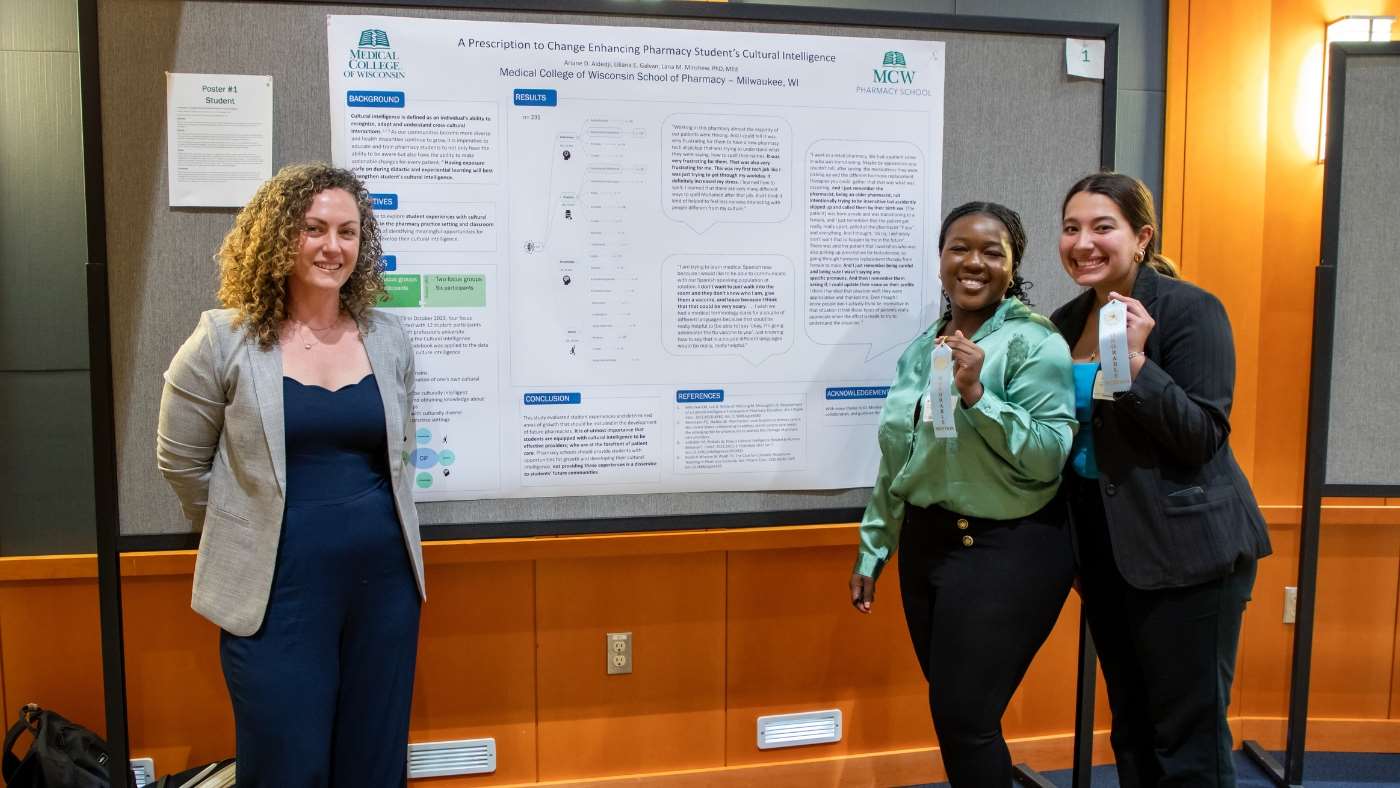MCW School of Pharmacy Faculty Incorporate Cultural Intelligence, Mental Health First Aid and Medication Reconciliation Activities into the Classroom

At the Innovations in Healthcare Education Research (IHER) Conference in September 2024, hosted by the Medical College of Wisconsin (MCW), faculty in the MCW School of Pharmacy highlighted unique activities to enhance the student learning experience.
A Prescription to Change: Enhancing Pharmacy Student’s Cultural Intelligence
Lana Minshew, PhD, MEd, assistant professor, presented about exploring cultural interactions within pharmacy practice settings. This research was conducted with the goal of infusing learnings into the classroom space to help students strengthen their cultural intelligence.
Pharmacy students Liliana Galvan and Ariane Aidedji, both 2025 PharmD candidates, worked with Dr. Minshew on this project. They created a poster to present findings, and it was awarded honorable mention for ‘Best Training Poster’ at the American Association of Colleges of Pharmacy (AACP) annual education conference, which took place in July 2024 in Boston.
“Cultural intelligence is more than just learning about other places, and it goes beyond cultural knowledge or cultural competence,” explained Dr. Minshew. “It’s thinking about how you are interacting with individuals from other cultures – through beliefs, values, attitudes and body language – and whether you have the capability to tune those interactions to function effectively in diverse spaces."
This concept is particularly important for pharmacy educators and students in Wisconsin to consider as the state is home to the third largest Hmong population in the country, almost four percent of residents identify as LGBTQ+ and as the state’s Latinx and African American populations continue to grow.
Dr. Minshew has a history of experience with this topic, previously developing a framework to teach future pharmacists how to provide culturally intelligent care. The framework includes: awareness about your own culture and view of the world, the knowledge of other cultures and different ways culture can shape interactions in the clinical or hospital setting and finally, the desire to learn how to strengthen your cultural intelligence.
The study utilized focus groups where pharmacy students shared their experiences providing care to individuals from cultures different from their own. One student described a language barrier while administering an influenza vaccination to a Spanish-speaking patient – another mentioned dispensing testosterone to a patient who was transitioning and asking the patient’s preferred pronouns so their chart could be updated.
“Pharmacy schools really should provide these opportunities for growth, have discussions about it and remind students that cultural intelligence is a journey that requires continuous reflection,” said Dr. Minshew. “Not providing these experiences is really a disservice to our students and to the communities they will serve in the future.”
Curing Stigma: Creation and Ongoing Delivery of a Mental Health Training Course for First-Year Pharmacy Students
Kevin Bozymski, PharmD, BCPS, BCPP, associate professor and psychiatric pharmacist in the Froedtert & the Medical College of Wisconsin (Froedtert & MCW) health network, conducted an analysis of mental health trends among pharmacy students and found high rates of anxiety and depression amongst MCW students, who participate in a three-year accelerated Doctor of Pharmacy curriculum.
Dr. Bozymski worked with Himanshu Agrawal, MD, DFAPA, associate professor and psychiatrist in the Froedtert & MCW health network, to implement Mental Health First Aid (MHFA) training into the curriculum for first-year pharmacy students. Out of various mental health training programs reviewed, MHFA was selected due to evidence that it decreases stigma surrounding mental health, increases confidence that participants know how to react to others experiencing a mental health crisis and increases empathy.
Utilizing grant funding from the Kern Institute Transformational Ideas Initiative, Drs. Bozymski and Agrawal became certified MHFA instructors and then created an elective course for first-year MCW pharmacy students, which was first delivered in winter 2021. After receiving additional funding from the Advancing a Healthier Wisconsin Endowment, Drs. Bozymski and Agrawal have now provided MHFA training to four cohorts of pharmacy students as well as healthcare workers across Wisconsin.
Researchers found that the added MHFA elective course can reduce mental health stigma, plus increase self-care initiatives and promote conversations about mental health challenges among MCW pharmacy students.
Utilizing a Medication Reconciliation Activity with Interruptions in a Professional Skills Laboratory to Improve Attention-to-Detail Among Pharmacy Students
Attention to detail is an important skill for pharmacy students to develop, as pharmacists need to keep medication lists updated and accurate. It can be challenging to gather this information in a busy pharmacy or hospital setting with distractions from phone calls, patients in the drive-through, side conversations with customers in line, questions from other healthcare providers and more.
First- and second-year pharmacy students were paired up in an activity created by Bonnie LaTourette, PharmD, BCPS, clinical assistant professor, and Rachel Kavanaugh, PharmD, BCACP, director of year two professional labs, to gather medication list information in a distracting environment. Students were assigned an initial patient case, reconciling a medication list and were then interrupted and asked to complete a large-group activity before resuming their patient case. During a second patient case, they were interrupted by a provider asking a drug information question.
Common errors during the medication reconciliation activity included failure to remove old medications, recording the wrong dose or wrong frequency and omitting prescriptions. With additional practice of medication history and reconciliations, students’ attention to detail improved. Students found the exercise to be valuable in identifying methods for accurately updating a medication list while being interrupted with competing pharmacist responsibilities.

